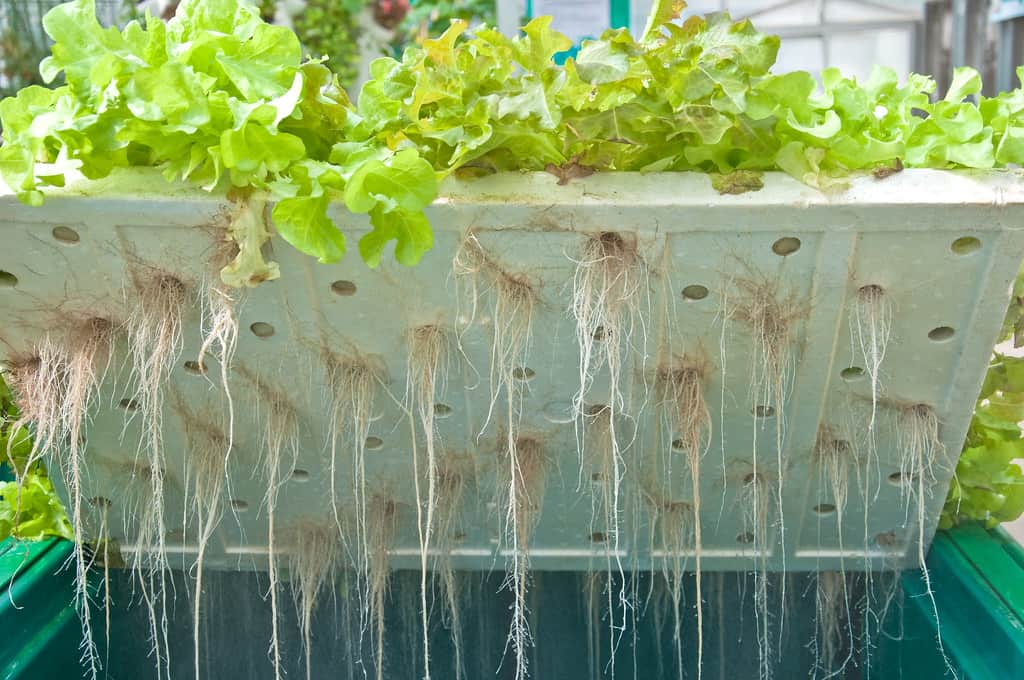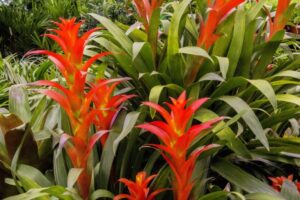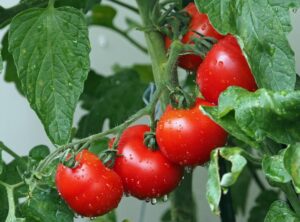The Ideal Hydroponic Reservoir Temperature is between 65°F (18°C) and 68°F (20°C). This temperature range will maintain optimal dissolved oxygen levels. If the water temperature gets warmer than this it can starve the roots of oxygen and it can lead to poor nutrient utilization.
If your hydroponic reservoir exceeds 68°F (20°C) on a regular basis then you’ll need a Water Chiller (Buy Online) to ensure your plants reach their full potential.
Otherwise, if your hydroponic reservoir falls below 60°F (15.5°C) then you’ll need a Titanium Immersion Water Heater (Buy Online) to keep the reservoir from becoming too cold and stunting your plant’s root development.
Ideal Hydroponic Reservoir Temperature
65°F (18°C) and 68°F (20°C)
Ideal Hydroponic Air Temperature
75°F (23.9°C) to 80°F (26.7°C)
Hydroponic Water Temperature Dissolved Oxygen Content
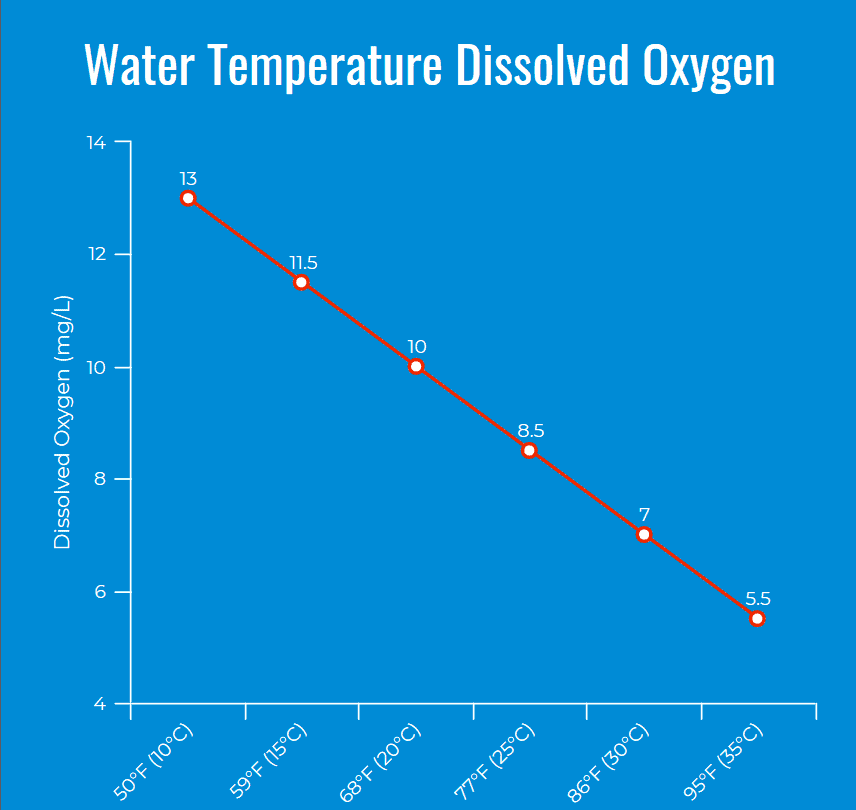
Temperature is directly correlated with the amount of dissolved oxygen a given volume of water can hold. As the temperature of the water rises it starts to out-gas dissolved oxygen out of solution.
A lack of dissolved oxygen can be especially problematic in deep water culture systems where a plant’s roots are submerged in the hydroponic reservoir at all times.
When the water temperature increases by 6°F (3.3°C) the there is a 3 mg/L drop in dissolved oxygen levels.
For example at 68°F (10°C) water can hold 10 mg/L of dissolved oxygen, and at 86°F (30°C) water can only maintain a 7 mg/L dissolved oxygen level.
Why Do Roots Need Cool Temperatures
Roots have evolved to grow underground in the soil where they are protected from light, and they are usually well insulated from hot temperatures. In a hydroponic system, we need to mimic this environment as much as possible to maximize root health.
Of course, root development can become stunted if your hydroponic reservoir temperature falls below 55°F (13°C). Most plants will stop utilizing nutrients and they’ll have a hard time generating new growth if the temperature falls below that level.
What Happens if Roots Get Too Hot
If your hydroponic reservoir gets too hot then the roots of the plants in the system will start to become oxygen-starved. The first signs of oxygen deprivation will be poor plant growth and limited root development. Then the roots will start to die off and turn a brown color. If this continues for too long you can lose the whole plant, or at best you’ll suffer a severe loss of the plants yield potential.
Warm water can also be a breeding ground for mold, bacteria, and fungus. All of these pathogens can harm your plant’s health and development. These microorganisms can also quickly spread to the other plants in your grow room. And once they take up residence in your hydroponic equipment they can be hard to remove without thorough sterilization.
Best Hydroponic Water Chillers
| Image | Name | Rating | Shop |
|---|---|---|---|
 | Hamilton Technology Aqua Euro Max Water Chiller | ||
 | EcoPlus Commercial Grade Water Chiller | ||
 | Chill Solutions Thermoelectric Water Chiller |
How To Cool Hydroponic Water
A Hydroponic Water Chiller (Buy Online) is the best way to keep your reservoir cool enough for proper root development. Chillers are small refrigeration systems that circulate the warm water from your reservoir over cooling coils. The chilled water is then returned to the reservoir, while the heat that was removed from the water is exhausted back into the surrounding air.
Since the heat is returned back into the air it’s important not to keep the chiller and the reservoir in the same room or grow tent. If you don’t separate the two systems then all the heat you removed with the chiller will just reheat the reservoir.
How Large Of A Hydroponic Water Chiller Will You Need?
The best way to size a hydroponic water chiller is to cool the water down to the ideal hydroponic reservoir temperature with ice. You’ll want to use bagged ice, so the ice doesn’t melt and increase the volume of water in the reservoir.
Once the water reaches the ideal hydroponic reservoir temperature, remove the ice and let the system run with the lights and pump on for at least an hour. After the hour is up you can measure the water temperature. Then subtract the temperature at the start from your final measurement to get the temperature differential.
The measured temperature differential can be used to find the properly sized chiller for your hydroponic system.
Take the number of gallons of water in your system and multiply it by 8.33 (specific weight of water @ 68°F (20°C)). Then multiply that by the temperature differential you got from your water temperature measurement. This will give you the total BTU’s the chiller will need to effectively cool your reservoir.
Reservoir Volume (Gallons) * 8.33 (γ Specific Weight Water) * Δ Temperature Differential = Chiller BTU’s
BTU/hr | HP (Tons of Refrigeration) |
1200 | 1/10 |
3000 | 1/4 |
6000 | 1/2 |
12000 | 1 |
18000 | 1 1/2 |
24000 | 2 |
Hydroponic Water Chiller Performance – Ambient Air Temperature
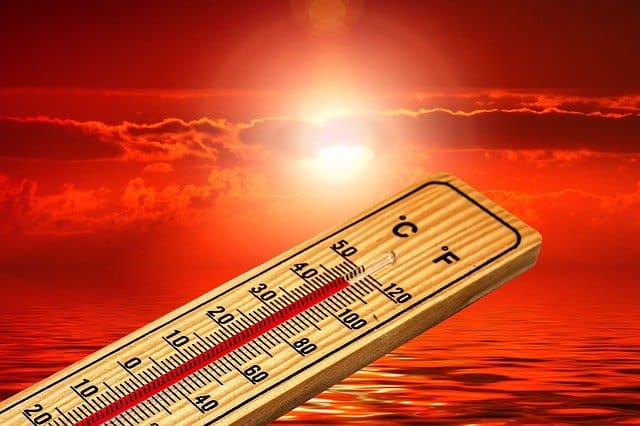
Ambient air temperature can affect a hydroponic water chiller’s performance. In warm environments, a chiller won’t be as effective at removing heat from the hydroponic reservoir.
A hydroponic chiller will work best in and environment that remains around 70°F to 80°F.
That’s why it’s best to locate your chiller outside your grow tent/ grow room to maximize the chiller’s effectiveness.
Hydroponic Water Temp Too Cold
If your hydroponic reservoir is too cold this can lead to problems with plant growth and root development. Equipment like lights and water pumps are usually enough to keep the water in the reservoir warm enough. However, efficient LED lighting and high powered carbon filter exhaust systems can limit ambient heat gain in colder climates.
If you’re reservoir temperature regularly falls below 60°F (15.5°C) then you’ll need to get a Titanium Water Heater (Buy Online). These submersible water heaters are corrosion and crack resistant, and they are better suited for a hydroponic system than an aquarium heater.
Best Hydroponic Water Heaters
| Image | Name | Rating | Shop |
|---|---|---|---|
 | Titanium Fully Submersible Portable Electric Immersion Water Heater 1300W 120V | ||
 | Hygger Titanium Water Heater |
Hydroponic Water Heater Capacity
Volume | 9°F (Temp Increase) | 27°F (Temp Increase) |
10 Gallon | 50 Watt | 75 Watt |
20 Gallon | 50 Watt | 150 Watt |
40 Gallon | 100 Watt | 300 Watt |
50 Gallon | 150 Watt | 500 Watt |
75 Gallon | 250 Watt | 750 Watt |
Hydroponic Reservoir Mixer
A Hydroponic Reservoir Mixer (Buy Online ) will ensure the temperature in your hydroponic reservoir is evenly distributed. The pump will churn the reservoir so the hotter top layer of water is thoroughly mixed with the cooler denser water in the bottom of the reservoir.
You might also need to get a hydroponic reservoir mixing pump for certain chillers. Some models of chillers don’t come with built-in pumps, so you’ll need to get a pump to power the chiller.
Hydroponic Water Heaters also work better with a hydroponic reservoir mixer since they tend to rely on passive diffusion to spread heat throughout a large volume of water. A mixing pump can help speed up heat transfer and it can reduce the risk of the heater causing problems with localized overheating.
Resources:
https://www.esf.edu/efb/schulz/Limnology/Oxygen.html
https://lib.dr.iastate.edu/cgi/viewcontent.cgi?article=11951&context=rtd
http://sitn.hms.harvard.edu/flash/2019/hydroponics-the-power-of-water-to-grow-food/


